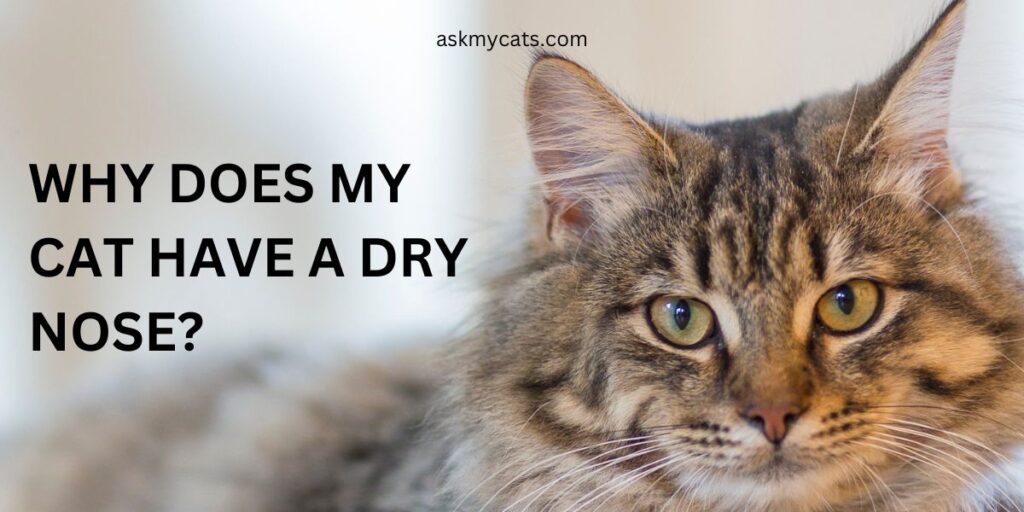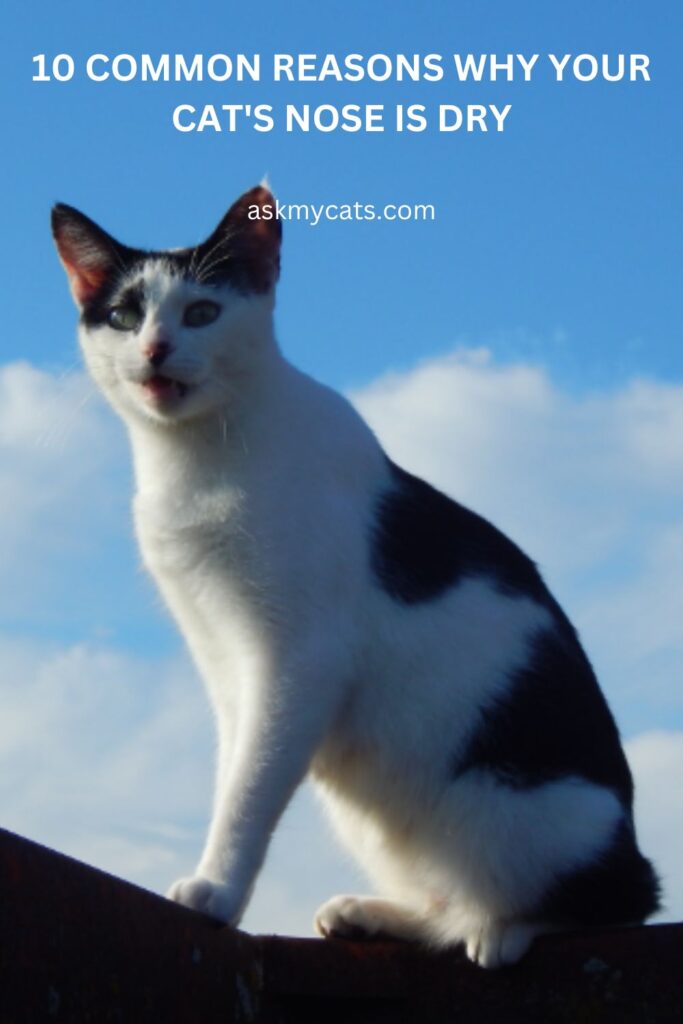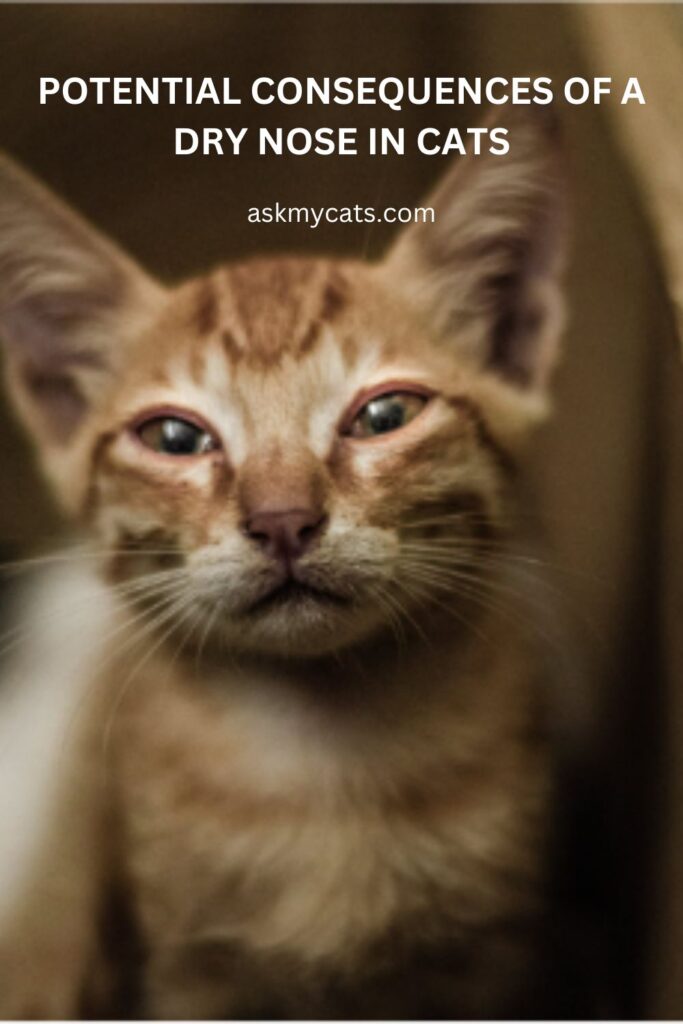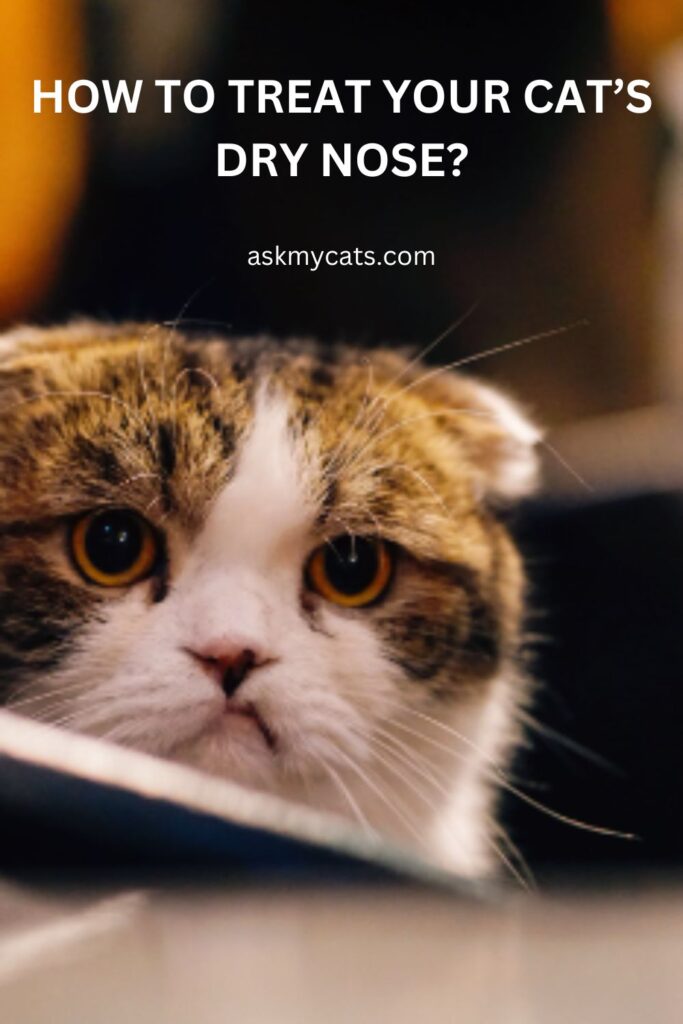Of all the mysteries surrounding our feline friends, the dry nose phenomenon is one of the most perplexing. As cat owners, we often assume that a wet nose is a sign of good health, and a dry nose must be a red flag for illness. But is this really the case?
In this article, we’ll explore the reasons why your cat might have a dry nose, what it means for their health, and whether or not you should be concerned.
From common causes like sun exposure and dehydration to more serious conditions like allergies and infections, we’ll break down the science behind the dry nose and help you keep your furry friend happy and healthy.
So grab a cup of tea and get ready to learn all about the mysterious world of feline noses.
Key Takeaways
- A dry nose in cats is not always a cause for concern, as some cats naturally have dry noses.
- Dehydration, allergies, sun exposure, stress, respiratory infections, skin conditions, medications, age, and underlying medical conditions can all cause a cat’s nose to become dry.
- Potential consequences of a dry nose in cats include cracked and painful skin, increased susceptibility to infections, discomfort and irritation, and dehydration.
- It’s important to monitor your cat’s overall health and behavior if they have a dry nose, and consult a veterinarian if other symptoms are present or if the dryness persists.


Give Your Cat the Perfect Day
Get the Free Ebook!
10 Common Reasons Why Your Cat’s Nose Is Dry

Here are 10 reasons why your cat’s nose may be dry:
- Normal Variation: Just like people, some cats naturally have dry noses, and it’s nothing to worry about. As long as your cat is healthy and doesn’t show any other symptoms, a dry nose is usually not a cause for concern.
- Dehydration: If your cat is not drinking enough water or is experiencing diarrhea or vomiting, they may become dehydrated, which can cause a dry nose. Make sure your cat has access to fresh water at all times and consider switching to wet food if they are primarily fed dry kibble.
- Allergies: Allergic reactions to environmental irritants, such as pollen, dust, or cigarette smoke, can cause your cat’s nose to become dry and irritated.
- Sun Exposure: Spending too much time in the sun without protection can cause your cat’s nose to become dry and cracked.
- Stress: Cats can become stressed or anxious for a variety of reasons, including changes in their environment or routine. Stress can lead to a dry nose and other symptoms such as decreased appetite and increased lethargy.
- Respiratory Infections: Respiratory infections like feline herpesvirus can cause your cat’s nose to become dry and irritated. Other symptoms of respiratory infections may include sneezing, coughing, and nasal discharge.
- Skin Conditions: Skin conditions like dermatitis or eczema can affect the skin around your cat’s nose, causing it to become dry and flaky.
- Medications: Some medications can cause dryness in the nasal passages and mucous membranes, leading to a dry nose in cats.
- Age: As cats age, they may produce less moisture in their noses, causing them to become dry and cracked.
- Underlying Medical Conditions: In rare cases, a dry nose can be a sign of an underlying medical condition such as autoimmune disease or cancer. If your cat’s dry nose is accompanied by other symptoms or if it persists for an extended period, it’s best to consult your veterinarian.
Interesting Read: Cat Nasal Congestion: Unblocking the Sniffles
Signs and Symptoms of Cat’s Dry Nose
| Symptom | Description |
|---|---|
| Dryness | The cat’s nose feels dry to the touch and lacks the usual moisture. |
| Cracks | The skin on the cat’s nose may appear cracked or flaky. |
| Discoloration | The color of the cat’s nose may be dull or pale instead of the usual moist and shiny appearance. |
| Sneezing | Cats with dry nose may sneeze more frequently due to nasal irritation. |
| Discharge | In some cases, a cat’s dry nose may be accompanied by nasal discharge, which can be clear or colored. |
| Lethargy | If a cat’s dry nose is due to dehydration or an underlying illness, the cat may also exhibit signs of lethargy, decreased appetite, or other systemic symptoms. |
Must Read: How To Make A Cat Sneeze To Clear Nose?
Potential Consequences Of A Dry Nose In Cats

While a dry nose in cats is usually not a cause for concern on its own, there are potential consequences that could arise if left untreated. Here are a few:
- Cracked and painful skin: When the skin around your cat’s nose becomes dry, it can crack and become painful. This can make it difficult for your cat to eat, drink, and groom themselves comfortably.
- Increased susceptibility to infections: A dry nose can also make your cat more susceptible to infections. The nasal passages and mucous membranes serve as a barrier against bacteria and viruses, and if they are dry and cracked, it can be easier for pathogens to enter the body.
- Discomfort and irritation: A dry nose can be uncomfortable and irritating for your cat, leading to excessive scratching and rubbing of the nose, which can further exacerbate the problem.
- Dehydration: If your cat’s nose is dry due to dehydration, it can be a sign that your cat is not getting enough fluids, which can lead to more serious health problems if left untreated.
While a dry nose in cats is usually not a cause for concern, it’s important to monitor your cat’s overall health and behavior to ensure that there are no underlying issues that may be causing the dryness.
If you notice any other symptoms or if your cat’s dry nose persists, it’s best to consult your veterinarian for further evaluation and treatment.
Interesting Read: Why Do Cats Have Wet Noses?
What Else Should I Look For If My Cat Has A Dry Nose?
If your cat has a dry nose, there are several other things you should look for to determine if there is an underlying issue that needs attention. Here are a few signs to watch for:
- Loss of Appetite: If your cat has a dry nose and is not interested in eating or drinking, it could be a sign of an underlying health issue.
- Lethargy: If your cat is unusually tired or inactive, it could be a sign that they are not feeling well. A dry nose combined with lethargy could indicate an underlying condition.
- Excessive Sneezing: If your cat is sneezing frequently and has a dry nose, it could be a sign of a respiratory infection or allergy.
- Discharge: If your cat’s dry nose is accompanied by discharge from the eyes or nose, it could be a sign of a bacterial or viral infection.
- Changes in Behavior: If your cat’s dry nose is accompanied by changes in behavior, such as hiding or avoiding interaction, it could be a sign that they are not feeling well.
- Dehydration: If your cat’s dry nose is accompanied by other signs of dehydration, such as sunken eyes or lethargy, it is important to get them evaluated by a veterinarian.
Must Read: Effective Home Remedies for Cat Nasal Congestion
When To Worry About A Cat’s Dry Nose?
While a dry nose in cats is usually not a cause for concern, there are situations where it may indicate an underlying health problem.
You should be worried about a cat’s dry nose if it is accompanied by crusty or flaky skin, discharge from the eyes or nose, difficulty breathing, loss of appetite, lethargy, or other changes in behavior.
If you notice any of these signs, it’s best to consult with your veterinarian for further evaluation and treatment.
Interesting Read: Runny Cat Nose: Causes, Symptoms, and Remedies
How To Treat Your Cat’s Dry Nose?

The treatment for a cat’s dry nose depends on the underlying cause.
Here are a few tips that may help treat your cat’s dry nose:
- Keep your cat hydrated: Make sure your cat has access to plenty of fresh, clean water. Dehydration can cause a dry nose, so keeping your cat hydrated is important.
- Use a humidifier: A humidifier can help add moisture to the air, which can help relieve your cat’s dry nose.
- Apply a moisturizer: You can use a cat-friendly moisturizer, such as petroleum jelly, coconut oil, or a specially formulated nose balm, to help moisturize your cat’s nose.
- Consult with your veterinarian: If your cat’s dry nose is accompanied by other symptoms or doesn’t improve with at-home remedies, it’s best to consult with your veterinarian for further evaluation and treatment. Your veterinarian may recommend medication or additional tests to determine the underlying cause of your cat’s dry nose.
It’s important to note that some cats naturally have dry noses, and it may not require any treatment.
Interesting Read: Why Do Cat’s Noses Get Wet When They Purr?
Frequently Asked Questions
Is a dry nose in cats a sign of illness?
Not necessarily. Some cats naturally have dry noses, but it can be a sign of an underlying health problem if accompanied by other symptoms.
Can I use human moisturizers on my cat’s dry nose?
No, it’s best to use cat-friendly moisturizers, such as petroleum jelly, coconut oil, or a specially formulated nose balm.
How can I prevent my cat’s nose from getting dry?
Make sure your cat stays hydrated and consider using a humidifier to add moisture to the air.
When should I take my cat to the vet for a dry nose?
If your cat’s dry nose is accompanied by other symptoms or doesn’t improve with at-home remedies, it’s best to consult with your veterinarian for further evaluation and treatment.
Can a dry nose in cats be a sign of dehydration?
Yes, a dry nose can be a sign of dehydration, so make sure your cat has access to plenty of fresh, clean water.
Must Read: How To Clean A Cat’s Nose? Safely and Effectively!
Final Words
Your cat’s nose may be dry for a variety of reasons, but it’s important to pay attention to any accompanying symptoms or changes in behavior.
While a dry nose may be a normal variation in some cats, it could also be a sign of an underlying health issue. By staying informed and taking appropriate steps, you can help keep your furry friend healthy and happy.
Remember, if you have any concerns, don’t hesitate to consult with your veterinarian.
Interesting Read: Why Does My Cat Nose Bump Me?
Must Read: Home Remedies for Cat Runny Nose
